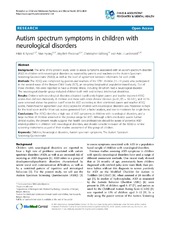| dc.contributor.author | Ryland, Hilde Katrin | |
| dc.contributor.author | Hysing, Mari | |
| dc.contributor.author | Posserud, Maj-Britt Rocio | |
| dc.contributor.author | Gillberg, Christopher | |
| dc.contributor.author | Lundervold, Astri Johansen | |
| dc.date.accessioned | 2013-05-16T09:49:00Z | |
| dc.date.available | 2013-05-16T09:49:00Z | |
| dc.date.issued | 2012-11-12 | eng |
| dc.Published | Child and Adolescent Psychiatry and Mental Health 2012, 6:34 | eng |
| dc.identifier.issn | 1753-2000 | |
| dc.identifier.uri | https://hdl.handle.net/1956/6617 | |
| dc.description.abstract | Background: The aims of the present study were to assess symptoms associated with an autism spectrum disorder (ASD) in children with neurological disorders as reported by parents and teachers on the Autism Spectrum Screening Questionnaire (ASSQ), as well as the level of agreement between informants for each child. Methods: The ASSQ was completed by parents and teachers of the 5781 children (11–13 years) who participated in the second wave of the Bergen Child Study (BCS), an on-going longitudinal population-based study. Out of these children, 496 were reported to have a chronic illness, including 99 whom had a neurological disorder. The neurological disorder group included children both with and without intellectual disabilities. Results: Children with neurological disorders obtained significantly higher parent and teacher reported ASSQ scores than did non-chronically ill children and those with other chronic illnesses (p<.01; ES = .50-1.01), and 14.1% were screened above the positive cutoff score for ASD according to their combined parent and teacher ASSQ scores. Parent/teacher agreement over ASSQ scores for children with neurological disorders was moderate to high for the total score and for three sub scores generated from a factor analysis, and low to moderate for single items. Conclusions: The ASSQ identifies a high rate of ASD symptoms in children with neurological disorders, and a large number of children screened in the positive range for ASD. Although a firm conclusion awaits further clinical studies, the present results suggest that health care professionals should be aware of potential ASD related problems in children with neurological disorders, and should consider inclusion of the ASSQ or similar screening instruments as part of their routine assessment of this group of children. | en_US |
| dc.language.iso | eng | eng |
| dc.publisher | Child and Adolescent Psychiatry and Mental Health | eng |
| dc.relation.ispartof | <a href="http://hdl.handle.net/1956/9250" target="blank">Social functioning and mental health in children: the influence of chronic illness and intellectual function</a> | eng |
| dc.rights | Attribution CC BY | eng |
| dc.rights.uri | http://creativecommons.org/licenses/by/2.0 | eng |
| dc.subject | Neurological disorders | eng |
| dc.subject | Autism spectrum symptoms | eng |
| dc.subject | The Autism Spectrum Screening Questionnaire | eng |
| dc.title | Autism spectrum symptoms in children with neurological disorders | eng |
| dc.type | Peer reviewed | |
| dc.type | Journal article | |
| dc.description.version | publishedVersion | |
| dc.rights.holder | Copyright 2012 Ryland et al.; licensee BioMed Central Ltd. | |
| dc.identifier.doi | https://doi.org/10.1186/1753-2000-6-34 | |
| dc.identifier.cristin | 963049 | |
| dc.source.journal | Child and Adolescent Psychiatry and Mental Health | |
| dc.source.40 | 6 | |
| dc.source.14 | 34 | |

